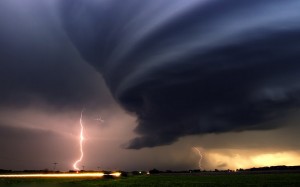 In 1997, Arkansas Governor Mike Huckabee objected to the wording of a bill designed to guarantee insurance coverage for victims of catastrophic weather. He wanted to strike the expression “Acts of God” from the document and substitute reference to “natural disasters.” He said, “While I realize that to some this is a minor issue, it is a matter of deep conscience with me to attribute in law a destructive and deadly force as being an ‘act of God.’” He added, “I refuse to walk through tornado damage and to say that what destroyed it was God and what built it back was only human beings . . . I saw God protect a lot of people, save a lot of people. That’s an act of God, too.”[i] Of course, the two things are compatible – God’s role both in destruction and deliverance. But it is interesting that the law books reserve the expression for floods and hurricanes, avoiding its application to the gentle rain that replenishes parched earth or the cooling breeze that blesses the farmer after a hot day in the fields.
In 1997, Arkansas Governor Mike Huckabee objected to the wording of a bill designed to guarantee insurance coverage for victims of catastrophic weather. He wanted to strike the expression “Acts of God” from the document and substitute reference to “natural disasters.” He said, “While I realize that to some this is a minor issue, it is a matter of deep conscience with me to attribute in law a destructive and deadly force as being an ‘act of God.’” He added, “I refuse to walk through tornado damage and to say that what destroyed it was God and what built it back was only human beings . . . I saw God protect a lot of people, save a lot of people. That’s an act of God, too.”[i] Of course, the two things are compatible – God’s role both in destruction and deliverance. But it is interesting that the law books reserve the expression for floods and hurricanes, avoiding its application to the gentle rain that replenishes parched earth or the cooling breeze that blesses the farmer after a hot day in the fields.
But what of the deeper issue, whether God could be the author of killer storms? If so, why would He visit so much grief on a people? Queen Anne had an answer when a horrific storm hit southern England in 1703, killing 8,000 of her subjects. Her official proclamation read,
Whereas it hath pleased Almighty God to afflict our kingdom by terrible Storms of Wind … many ships were sunk … great numbers have perished … houses and buildings demolished … corn and hay scattered abroad … very great damage and impoverishment … it loudly calls for the deepest and most solemn humiliation … we humbly acknowledge it to be a token of Divine displeasure … through God’s infinite mercy we were not wholly destroyed … we have resolved and do hereby command that a General Public Fast be observed.[ii]
Her quote enjoys the patina of royal venerability, but similar, current voices are usually less well received. For instance, when Austrian bishop Gerhard Maria Wagner deemed Hurricane Katrina “divine retribution” for New Orleans’ decadence, he stirred up a host of critics. By his castigated account, the city’s “conditions of immorality” were “indescribable,” and it was “no coincidence that in New Orleans all five abortion clinics as well as night clubs were destroyed.”[iii]
Of course, Christians are not the only ones offering spiritual takes on natural disasters. Voltaire took advantage of the 1755 Lisbon earthquake, which took 100,000 lives, to mock those who claimed that God was blamelessly sovereign over the world.[iv]
So what is the Christian to make of these things? First, Scripture is clear that God can and does use the weather for His purposes. As it says in Job 37:13, “He brings the clouds to punish people, or to water his earth and show his love.” For instance, in Exodus 9, God followed through on His promise to Pharaoh through Moses to hit Egypt with a great hailstorm. And in order to turn the wayward Jonah back toward Nineveh, “the Lord sent a great wind on the sea, and such a violent storm arose that the ship threatened to break up” (Jonah 1:4). Nevertheless, the Bible discourages speculation on particular reasons for specific tragedies, as when Jesus embarrassed his disciples in John 9:9, where they asked whether a man’s blindness was his fault or his father’s.
Of course, there are many other biblical examples and precepts that speak to this issue, but the basic principles stand out, that one must be very careful both about ruling out divine action through disasters and about proclaiming which of His purposes are in play in their occurrence.